Action Plan Announced at FfD4 to Mobilize Private Sector Capital in Developing Countries
Addis Ababa, July 2, 2025 (FMC) – A coalition of governments, international development partners and private sector groups announced the development of an Action Plan to increase mobilize private sector capital at scale in developing countries.
The Action Plan was announced at the Fourth Financing for Development Conference (FfD4) in Seville, Spain.
A coalition includes the UN Capital Development Fund, UN Economic Commission for Africa, African Union Commission, Organisation for Economic Cooperation and Development (OECD), Global Investors for Sustainable Development (GISD) Alliance.
Ministry for Foreign Affairs of Finland, Norway Ministry of Foreign Affairs and Norad, Switzerland SECO and Convergence Blended Finance, are also part of the abolition that announced announcing the development of an Action Plan to increase mobilize private sector capital at scale in developing countries.
The Action Plan seeks to tackle poverty, economic growth and climate risks by deploying public sector resources through blended finance to mobilize private investment in underserved markets, which, over the last decade, has remained weak even as global wealth has ballooned.
The Action Plan will include a dedicated Least Developed Countries (LDCs) and Africa-focused track to advance context-specific blended finance approaches and support scalable investment opportunities in key sectors.
The Action Plan will describe practical measures to mobilize private investment using standardized and replicable blended finance models tailored to country contexts, with an emphasis on alignment with national priorities and global development goals.
FFD4 is a once-in-a-decade gathering of development partners seeking to build a renewed global financing framework to urgently unlock greater volumes of capital to close the financing gap of developing countries.
Government-sourced Official Development Assistance (ODA) declined last year by over 7% compared with 2023, according to the Organisation for Economic Cooperation and Development (OECD), one of the co-proposers of the Action Plan.
“Bridging Africa’s investment gap demands bold, coordinated action. This Action Plan marks a turning point, a practical blueprint to shift global capital toward sustainable development in countries that need it most, Claver Gatete, Executive Secretary, UN Economic Commission for Africa (UNECA) said.
He also expressed ECA’s commitment to ensuring that Africa is not only part of the conversation, but central to the solution.
While global assets have doubled to $482 trillion over the last decade, private sector investment to and within low- and middle-income countries has remained stubbornly weak. Only 5% of those global assets are invested in developing countries, excluding China, according to the Financial Stability Board, an international body that monitors the global financial system.
The world stands at a crossroads for financing sustainable development with an estimated annual financing gap of $4 trillion – up from $2.5 trillion pre-pandemic, according to ECA.
Blended finance has the potential to transform private investment flows and positively contribute to the FfD4 Outcome Document mobilization objectives and to the SDGs.
Signatories of the Joint Initiative have committed to develop an “effective, efficient, fair and practical action plan” through the remainder of 2025 and into 2026 to identify how to use a blend of public sector and philanthropic resources to mobilize and crowd-in larger amounts of private sector finance for development results at scale.

